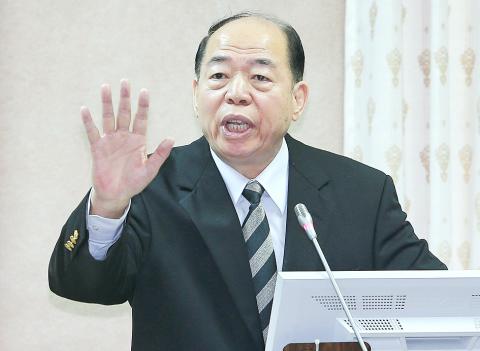The nation’s high-tech sector is under serious threat of industrial espionage as Chinese intelligence operatives target local companies for infiltration and collection of proprietary information, National Security Bureau (NSB) Director-General Yang Kuo-chiang (楊國強) told legislators yesterday.
Yang made the remarks during a question-and-answer session at a meeting of the legislature’s Foreign Affairs and National Defense Committee meeting.
New Power Party Legislator Freddy Lim (林昶佐) said he has grave concerns over Chinese espionage operations, because there have been numerous cases involving Chinese spies luring members of the nation’s armed forces into leaking classified military information.

Photo: CNA
“In addition to our military, which Taiwanese industries have been most seriously affected by Chinese spy infiltration?” Lim asked. “I would like to know, because I want these businesses to be alert to this danger so they can be more careful when hiring new workers.”
Yang said that the semiconductor and other tech sectors are the most likely targets.
Lim said that these sectors are key to the nation’s economy, and “yet President Ma Ying-jeou (馬英九) wants to open up the nation’s technology sector for investment by Chinese business. This is just absurd.”
Democratic Progressive Party (DPP) Legislator Wang Ting-yu (王定宇) said that Yang and the bureau should block bids by Chinese investors and companies to buy out Taiwanese tech businesses.
Wang was referring to the Investment Commission, which is tasked with the review, assessment and monitoring of foreign investment, and where the bureau has a representative seat.
He said the semiconductor sector is a pillar of the nation’s economy and the bureau should veto investment applications from China.
“Taiwan is a leader in IC design and we must not allow know-how and proprietary technology to be taken over by China. It is well-known that most large Chinese businesses are backed by financial capital from the Chinese government,” Wang said.
“So this is a national security issue and a serious threat to Taiwan’s economic development. Therefore, the NSB must not permit Chinese investment in the IC sector,” he added.
DPP Legislator Chiu Chih-wei (邱志偉) also asked Yang about the potential impact on cross-strait ties if China is not satisfied with president-elect Tsai Ing-wen’s (蔡英文) inauguration speech on May 20.
Yang said Beijing might shut down existing negotiation channels, prohibit Chinese tourists from visiting Taiwan, or take diplomatic action if it is unhappy with Tsai’s speech, Yang said.
The president would have to work with other senior government officials to make a response should China take any of the above three actions against Taiwan, Yang said.
Additional reporting by CNA

CALL FOR SUPPORT: President William Lai called on lawmakers across party lines to ensure the livelihood of Taiwanese and that national security is protected President William Lai (賴清德) yesterday called for bipartisan support for Taiwan’s investment in self-defense capabilities at the christening and launch of two coast guard vessels at CSBC Corp, Taiwan’s (台灣國際造船) shipyard in Kaohsiung. The Taipei (台北) is the fourth and final ship of the Chiayi-class offshore patrol vessels, and the Siraya (西拉雅) is the Coast Guard Administration’s (CGA) first-ever ocean patrol vessel, the government said. The Taipei is the fourth and final ship of the Chiayi-class offshore patrol vessels with a displacement of about 4,000 tonnes, Lai said. This ship class was ordered as a result of former president Tsai Ing-wen’s (蔡英文) 2018

UKRAINE, NVIDIA: The US leader said the subject of Russia’s war had come up ‘very strongly,’ while Jenson Huang was hoping that the conversation was good Chinese President Xi Jinping (習近平) and US President Donald Trump had differing takes following their meeting in Busan, South Korea, yesterday. Xi said that the two sides should complete follow-up work as soon as possible to deliver tangible results that would provide “peace of mind” to China, the US and the rest of the world, while Trump hailed the “great success” of the talks. The two discussed trade, including a deal to reduce tariffs slapped on China for its role in the fentanyl trade, as well as cooperation in ending the war in Ukraine, among other issues, but they did not mention

Japanese Prime Minister Sanae Takaichi yesterday lavished US President Donald Trump with praise and vows of a “golden age” of ties on his visit to Tokyo, before inking a deal with Washington aimed at securing critical minerals. Takaichi — Japan’s first female prime minister — pulled out all the stops for Trump in her opening test on the international stage and even announced that she would nominate him for a Nobel Peace Prize, the White House said. Trump has become increasingly focused on the Nobel since his return to power in January and claims to have ended several conflicts around the world,

GLOBAL PROJECT: Underseas cables ‘are the nervous system of democratic connectivity,’ which is under stress, Member of the European Parliament Rihards Kols said The government yesterday launched an initiative to promote global cooperation on improved security of undersea cables, following reported disruptions of such cables near Taiwan and around the world. The Management Initiative on International Undersea Cables aims to “bring together stakeholders, align standards, promote best practices and turn shared concerns into beneficial cooperation,” Minister of Foreign Affairs Lin Chia-lung (林佳龍) said at a seminar in Taipei. The project would be known as “RISK,” an acronym for risk mitigation, information sharing, systemic reform and knowledge building, he said at the seminar, titled “Taiwan-Europe Subsea Cable Security Cooperation Forum.” Taiwan sits at a vital junction on